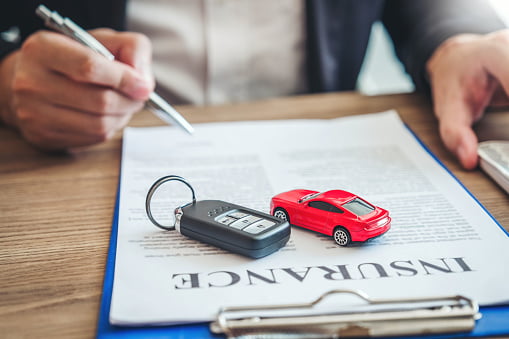Driving in Ontario comes with some challenges. Unpredictable gas prices, coupled with the slow return of commuters back on the roads, has many people thinking about the costs of owning a car. Maybe you suspended your coverage, or perhaps have put off buying a car until now. One of the mandatory costs of owning a vehicle is auto insurance. If you’re wondering how to get the best car insurance, you’re not alone. Our complete guide to auto insurance will take you through the basics of an insurance policy to help educate you on which coverage is best for you.
WHAT “AUTO INSURANCE” MEANS
Auto insurance is not only about insuring your vehicle, it is also about protecting you, the driver. Basically, auto insurance protects you and your vehicle against risk by covering unforeseen damages. And just like seat belts, auto insurance is legally required for all drivers. No matter your age or years of driving experience, auto insurance is mandatory. If you own or drive a car, you must have insurance from a private insurer in Ontario. Many insurance policies include a deductible, which is the portion of a claim paid by you, the policyholder, for damages. Agreeing to pay a higher deductible means your auto insurance premiums will be lower.
Standard auto insurance policies in Canada typically include:
- Third-Party Liability: Provides compensation for drivers if they’re at-fault in an accident and the other party is hurt or killed. It also covers damages to the other person’s property and related repair costs.
- Accident Benefits: Includes coverage for injuries sustained in a collision. This includes medical care, rehabilitation and income replacement for drivers, passengers and pedestrians involved in the accident.
- Uninsured Automobile Coverage: Offers coverage for injuries and damages sustained through the fault of a driver who is uninsured or unable to be identified (in the case of hit-and-runs).
- Direct Compensation Property Damage (DCPD): In provinces with no-fault insurance, DCPD means you will deal with your own insurer for car repairs and other damaged property. If you’re not at-fault for an accident in a province without DCPD, you will have to seek property damage compensation from the other party’s insurance company.
Optional coverages to consider
Once you’ve gotten your basic quote, there are additional coverage options you may want to consider. Mandatory coverages listed above work together to offer you financial protection against common claims. However, these don’t cover damages to your own vehicle. For that, you will need to purchase optional coverages.
The following two types of coverages are recommended as add-ons or endorsements:
- Collision insurance: Covers costs related to the repair or replacement of your vehicle if you are at-fault. It will cover you for a collision with another car or an object, such as a tree or pothole. Our variable Canadian weather and never-ending construction season have caused many drivers to opt-in for collision coverage.
- Comprehensive coverage: Covers repairs to or replacement of a vehicle that has been damaged by something other than a collision. This can include a fire, theft, vandalism or a wind or hail storm—basically, factors that are often considered outside of your control.
GETTING YOUR AUTO INSURANCE QUOTE
Choosing the right insurance coverage for your needs can seem daunting. With so many types of coverage, add-ons and variables that determine what you will pay in premiums, you may find there isn’t a straightforward answer. However, there are a few steps you can take to feel confident that you’re getting the right amount of coverage at a competitive rate.
First, it’s important that you understand the different components of an auto insurance policy. For more detailed information, you may also want to consult the Insurance Bureau of Canada (IBC) for general information on the car insurance rules specific to your province. We encourage you to contact isure if you have any questions or concerns regarding auto insurance.
Factors that affect premiums
Next, we’ll help you shop around for the best auto insurance rates. There are many factors that go into calculating your insurance premiums. Here are just a few:
- Personal details: Factors, such as your age, gender and level of driver’s license play a role in your premiums. Insurers also look at your driving record when calculating your rate.
- Your location: Where you live influences how much auto insurance you pay. If you live in the downtown core, you have a higher risk of theft, accidents and damages. This increases the number of overall claims for your area, therefore increasing premiums.
- The make, model and production year of your vehicle: Your vehicle is as unique as you are. Therefore, the way it affects your premiums is unique, as well. For example, if your car is older, it is more likely to break down, which affects your risk. Conversely, newer models may have advanced safety features, which affects the amount of premium you pay, as well.
- Amount and type of usage: Hardly driving your car during the pandemic? You may qualify for lower car insurance rates. Some auto insurance companies offer telematics solutions to help you save more. Additionally, if you use your vehicles for business purposes, you may need to add business use on your personal auto insurance policy or purchase a separate commercial automobile insurance policy.
Lastly, speak with our professional isure brokers to set up your policy. There are many discounts available that may apply to you and can reduce the cost of your premiums.
FYI: In just a few simple steps and in less than three minutes, isure can give you an online auto coverage quote!
Final thoughts
It is in your best interest to understand the auto insurance coverages out there. Helping you find the right combination of mandatory and optional coverages to suit your needs is our specialty. To get the most value out of your car insurance, speak to one of our isure representatives. At isure, we make it easy for you to contact us directly by phone, email, or through isure’s Facebook page! Feel free to ask our brokers about what’s the best fit for you. We’ll give you objective advice on how much coverage you should carry and what your insurance really covers.
ONCE YOU’VE GOTTEN YOUR AUTO INSURANCE, YOU’RE READY TO HIT THE ROAD! DRIVE SAFELY!




